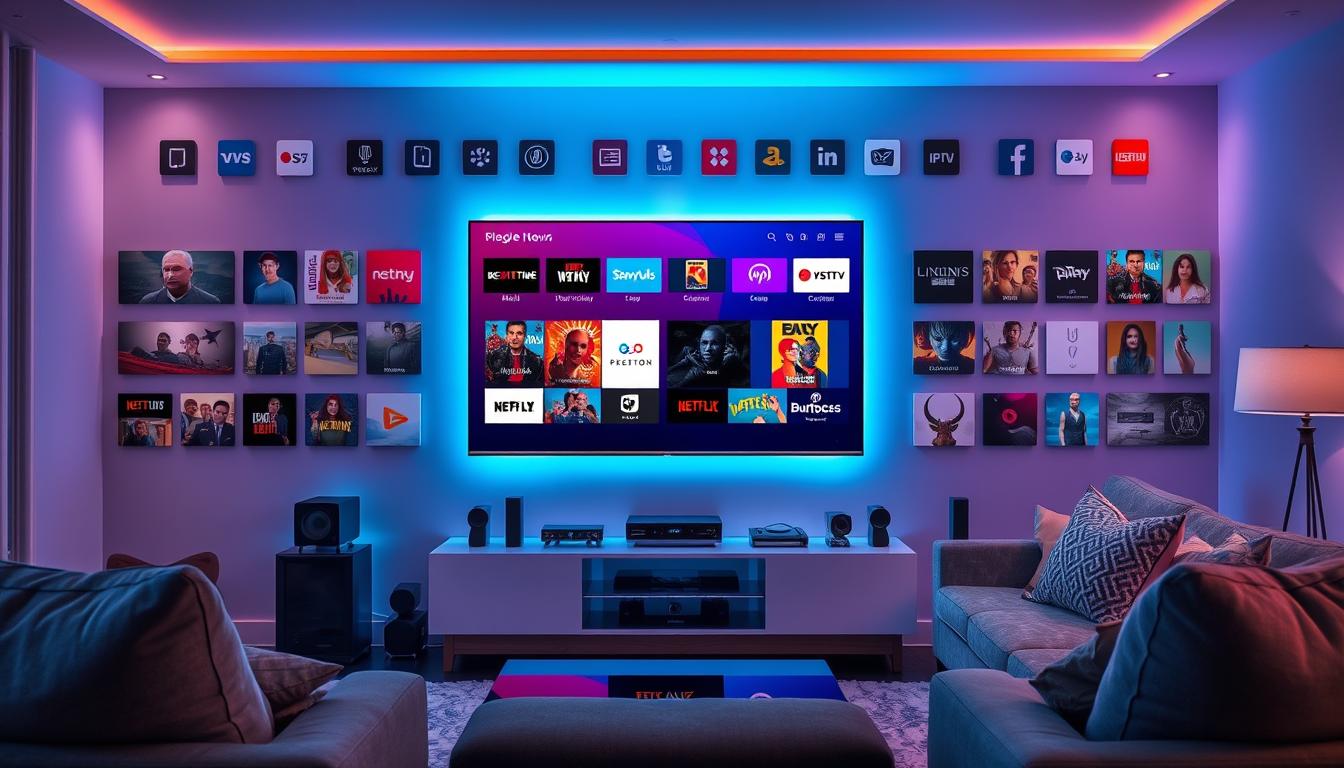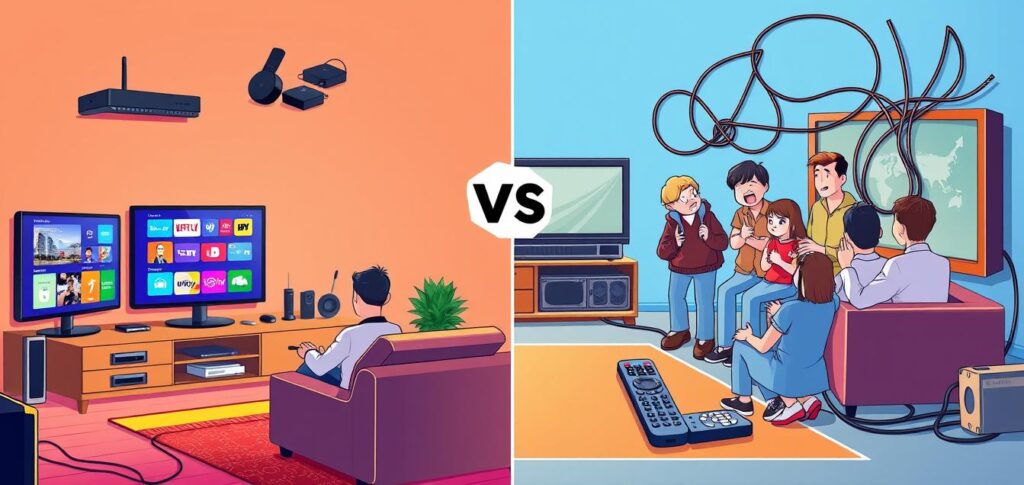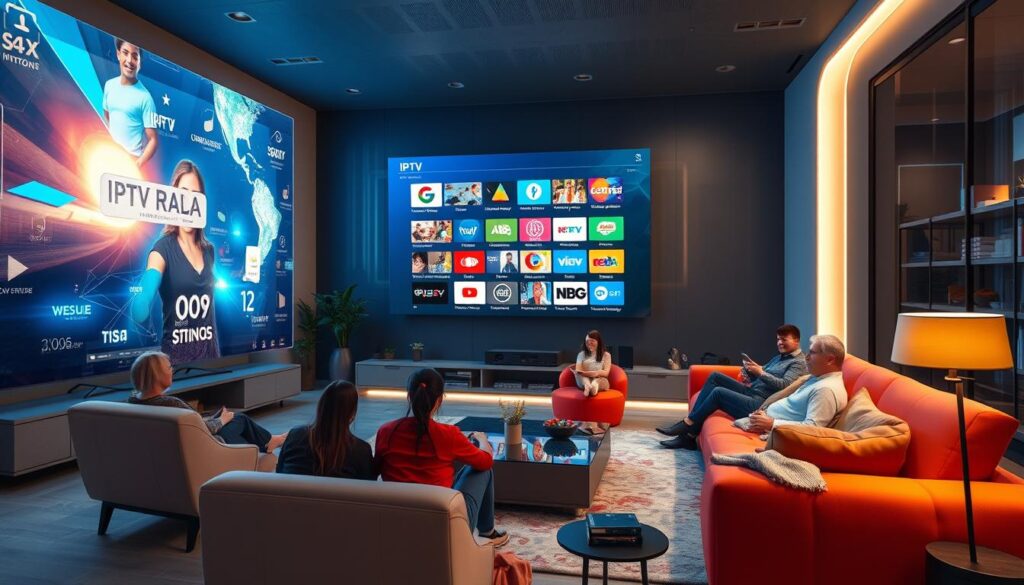
Have you ever thought about how TV changed from old cable boxes to new digital streaming? Welcome to IPTV, or Internet Protocol Television. It makes watching TV better and more flexible than before. With IPTV, you get to watch what you want, when you want it.
This guide will cover the basics of IPTV. You’ll learn how it’s different from old TV, its benefits, and why it’s becoming more popular. We’ll look at how services like subscriptioniptv.us are changing TV watching. Are you ready to see the future of TV? Let’s explore IPTV together!
Key Takeaways
- IPTV is changing TV by offering flexible viewing options.
- Unlike old TV, IPTV uses the Internet to bring you shows.
- Services like subscriptioniptv.us give you lots of choices.
- The move from cable to streaming is a big change in media.
- Knowing about IPTV can make your TV watching better.
- IPTV’s popularity in the US shows we want TV on our terms.
Introduction to IPTV
The rise of streaming technology has changed how we watch TV. It has led to the Introduction to IPTV. IPTV lets users stream TV over the Internet, not just through cable.
This change brings more flexibility and personalization. Viewers can pick what they want to watch. They also get on-demand programming.
IPTV is a new way to enjoy digital television. It means no more fixed TV schedules. Now, I can watch what I want, when I want.
This freedom from traditional TV channels is a big plus. It lets viewers control their TV experience better.
IPTV is also cheaper than traditional cable. It uses the Internet to offer more channels. This makes it a great choice for those who want more without spending too much.
| Feature | IPTV | Traditional Cable |
|---|---|---|
| Content Delivery | Internet-based | Cable-based |
| On-Demand Options | Yes | Limited |
| Cost | Typically lower | Generally higher |
| Flexibility | High | Low |
| Personalization | High | Low |
What is IPTV?
IPTV is a big deal in today’s TV world. It uses the internet to send TV shows, not old cable or satellite ways. This new method changes how we watch TV.
Defining Internet Protocol Television
IPTV brings TV to your screen over the internet. It lets you pick from lots of channels and watch shows when you want. You can watch on smart TVs, computers, or phones.
How IPTV Differs from Traditional TV
IPTV and old TV are different in how they work and feel. Old TV uses cable or satellite, which limits what you can watch. IPTV lets you choose what to watch and when, making it more flexible.
Looking into IPTV services, I found top providers in the USA. This shows how IPTV offers unique stuff that fits what you like, unlike old TV.
The Benefits of Using IPTV
IPTV is changing how we watch TV. It has many benefits, making it a great choice for viewers.
Cost-Effectiveness of IPTV Services
IPTV is very affordable. It can save a lot of money compared to cable TV. You can pick a plan that fits your viewing habits without losing quality.
Many providers offer good prices without long-term contracts. This adds flexibility that cable TV often doesn’t have. Here’s a quick look at the costs:
| Service Type | Average Monthly Cost | Contract Requirement |
|---|---|---|
| Cable TV | $100 – $200 | Often 1-2 Years |
| IPTV Services | $30 – $80 | No, Month-to-Month |
Flexible Viewing Options
IPTV offers great flexibility. You can watch your favorite shows anytime, not just when they’re on. Many services have DVR, so you can record and watch later.
This means your busy life won’t get in the way of your TV time. IPTV works on mobile devices too, so you can watch anywhere. It makes fitting TV into your life easy.
How IPTV Works
Learning about IPTV is key for better TV watching. IPTV uses the Internet to send TV shows. It’s different from old TV ways.
Shows aren’t sent by cable or satellite. Instead, they go over the internet. The steps include encoding, sending, and decoding to make watching smooth.
The Technology Behind IPTV
IPTV uses special streaming and codecs for smooth watching. It compresses videos to save bandwidth. This lets devices play the content well, even with slow internet.
IPTV also works well, even when lots of people are watching. This makes it reliable for everyone.
Components Necessary for IPTV
To get IPTV working, you need some things. First, you need a smart TV, streaming box, or computer. A fast internet connection is also key.
You also need an IPTV service to watch shows. Some might want better routers for better service.
If you’re looking at options, check out the best IPTV deals. It can help you see what services are out there.
Types of IPTV Services
Knowing about the different IPTV services can make watching TV better. Each type is for something special, like watching live events, movies, or catching up on shows. I like to check out these options to find what I want to watch.
Live IPTV Streaming
Live IPTV lets you watch things as they happen. You can see IPTV live streams for sports, news, and special events. It feels like regular TV but better because it’s live. There are lots of channels to choose from, so you’re always finding something new.
Video on Demand (VOD) Services
Video on Demand or VOD IPTV changed how we watch movies and shows. You can pick what you want to watch and when. With so many choices, you can always find something interesting. It makes watching TV easier and more fun.
Time-Shifted IPTV
Time-shifted IPTV lets you watch shows you missed later. This is called catch-up TV. It’s great for catching up on your favorite shows or sports games. It’s one of the main reasons people like IPTV.
| IPTV Type | Description | Benefits |
|---|---|---|
| Live IPTV Streaming | Real-time broadcasts of events such as sports and news. | Immediate access to current happenings. |
| Video on Demand (VOD) | Select and watch content at any time. | Convenience of choosing preferred shows and movies. |
| Time-Shifted IPTV | Access previously aired content through catch-up TV. | Flexibility to keep up with missed episodes. |
For more info on setting up these services, check out this guide. Knowing about these IPTV types can make your TV watching better. It helps you choose what you like best.
Subscription Models in IPTV
IPTV offers many subscription models to fit different tastes. You can pick from monthly, annual, or pay-as-you-go plans. Each plan has its own price, affecting how happy you’ll be with your service.
| Subscription Model | Payment Frequency | Access Type | Average IPTV Prices |
|---|---|---|---|
| Monthly | Monthly | Full access | $10 – $30 |
| Annual | Yearly | Full access | $100 – $300 |
| Pay-as-you-go | Per use | Limited access | Variable |
Choosing the right plan makes watching TV better and keeps costs down. Knowing about these models helps me make smart choices in the changing world of IPTV.
Choosing the Right IPTV Provider
Looking for the best IPTV service means knowing what to look for. It’s all about the content, how reliable the service is, and the support you get. Good performance and easy-to-use tech help make watching TV better.
What to Look For in an IPTV Service
When picking an IPTV provider, I look at a few key things:
- Content Variety: I want lots of channels to watch.
- Pricing Structure: It should be affordable without losing quality.
- User Interface: A simple, easy-to-use interface is important.
- Service Reliability: I need it to work well all the time.
- Customer Support: Good support helps fix problems fast.
Comparing Popular IPTV Providers
I’ve looked at some top IPTV providers to compare them. Here’s what I found:
| Provider | Monthly Price | Channels Offered | VOD Availability | Customer Support |
|---|---|---|---|---|
| Hulu + Live TV | $64.99 | 75+ | Yes | 24/7 Chat and Phone Support |
| FuboTV | $69.99 | 100+ | Yes | Live Chat & Email Support |
| Philo | $25.00 | 60+ | No | Email Support |
| Sling TV | $35.00 | 30+ | Yes | Online Chat and FAQ |
This info helps me choose the best IPTV provider for me. It’s all about finding the right mix of features and price.
How to Set Up IPTV at Home
Setting up IPTV at home is exciting. It can change how you watch TV. With the right tools, you can watch lots of channels and shows you like. An IPTV setup guide makes it easy to get started.
Required Equipment for IPTV Installation
First, you need to get the right stuff. Here’s what you might need:
- Router: A good router is key for smooth streaming.
- Streaming Device: Choose devices like Amazon Fire Stick, Roku, or Apple TV for IPTV apps.
- HDMI Cable: Connects your streaming device to the TV.
- Adapters: You might need special adapters for older TVs.
Simple Steps for Setting Up IPTV
With all your gear, you can start setting up. Just follow these steps:
- Hook up your streaming device to the TV with an HDMI cable.
- Turn on the device and connect it to your Wi-Fi.
- Get the IPTV app from your device’s app store.
- Open the app and put in your subscription info from your IPTV provider.
- Start exploring the channels and shows.
These steps will help you set up IPTV easily. Knowing what you need and how to do it makes it fun.
IPTV vs. Other Streaming Services
There are many streaming services out there. Knowing the differences helps me choose wisely. IPTV, Netflix, and Hulu have unique features like content and pricing. This info helps me find the best streaming service.
IPTV Compared to Netflix and Hulu
Looking at IPTV vs Netflix and IPTV vs Hulu, content is a big difference. Netflix has original shows and movies. Hulu focuses on TV shows and exclusive series. IPTV offers live TV and on-demand videos, blending both.
| Feature | IPTV | Netflix | Hulu |
|---|---|---|---|
| Content Type | Live TV & VOD | Originals & Movies | Current Shows & Originals |
| Subscription Flexibility | Highly customizable | Set plans only | Set plans only |
| Cost | Varies by provider | Standard monthly fee | Standard monthly fee |
Exploring IPTV advantages shows why it’s popular over cable TV. IPTV is cheaper and offers flexible plans. Cable TV has fixed contracts and fewer choices.
Advantages of IPTV over Cable TV
- Cost savings: IPTV often has lower monthly fees than cable.
- Flexibility: I can pick the channels I want, avoiding unwanted ones.
- Customization: IPTV lets me choose services based on my interests, making it more personal.
- Access to live and on-demand content: I can watch live TV and shows whenever I want.
It’s important to make smart choices in streaming. I like to compare IPTV with Netflix and Hulu. I also see the benefits it has over cable TV.
Legal Considerations for IPTV
Exploring IPTV means understanding legal issues. The IPTV legality rules change by area. Legal IPTV services follow copyright laws and licensing to offer content right.
It’s wise to pick legal IPTV services to dodge illegal streaming dangers. Not all IPTV providers are legal. They might stream content without permission, risking legal trouble for users. Choosing trusted providers keeps you safe and worry-free.
Here’s a look at legal vs. illegal IPTV services:
| Feature | Legal IPTV Services | Illegal IPTV Services |
|---|---|---|
| Content Licensing | All content is properly licensed | Content lacks proper licensing |
| Service Reliability | Generally stable and reliable | May experience frequent interruptions |
| User Accountability | Users protected by law | Users can face legal consequences |
| Content Quality | High-quality content offered | Quality may be poor or inconsistent |
Knowing the differences helps me enjoy IPTV safely. I support creators and enjoy legal content. It’s key for a great IPTV experience.
Common Issues and Troubleshooting IPTV
Many IPTV users face technical issues that can impact their viewing experience. Among these challenges, buffering and connectivity issues are the most common. Understanding the root causes of these problems is crucial for effective IPTV troubleshooting. I will also provide guidance on where to get help when these issues arise.
Buffering and Connectivity Problems
Buffering issues can disrupt your enjoyment of IPTV, causing interruptions and frustration. Here are some common causes and solutions:
- Poor Internet Connection: A slow or unstable internet connection often leads to buffering problems. I recommend testing your internet speed using online speed tests.
- Device Overload: Running multiple applications on your device can drain resources, causing buffering. Closing unnecessary applications might improve performance.
- Router Positioning: The location of your router in relation to your streaming device can affect signal strength. Try relocating your router to enhance connectivity.
- Service Outages: Occasionally, IPTV services may experience outages. Checking the provider’s official channels can confirm if there are service interruptions.
Finding Technical Support for IPTV
When troubleshooting proves difficult, knowing where to get help can make a difference. Here are some reliable options for seeking IPTV technical support:
- Official Support Channels: Most IPTV providers offer official support through their websites. This often includes live chat, email support, or a knowledge base for common issues.
- Community Forums: Engaging in community forums related to your IPTV service can provide useful insights from fellow users. These platforms often discuss solutions for various IPTV troubleshooting topics.
- Online Troubleshooting Guides: You can find many guidelines and articles online aimed at resolving specific IPTV issues. These resources can help you step through potential solutions.
| Issue | Possible Cause | Suggested Solution |
|---|---|---|
| Buffering | Slow Internet Speed | Upgrade your Internet plan or improve connection speed. |
| Connectivity Issues | Router Location | Relocate your router to a central position in your home. |
| Video Quality Problems | Device Overload | Close unused applications on your streaming device. |
| Service Outage | Provider Maintenance | Check official provider channels for outage updates. |
The Future of IPTV in the United States
The world of entertainment is changing fast. IPTV is at the forefront of this change. It’s getting more advanced and offering viewers what they want. This is exciting and shows a big shift in how we watch media.
Trends Shaping IPTV Evolution
Technology is key to IPTV’s growth. The arrival of 5G networks is making streaming better. It’s making connections faster and more reliable. This changes how we watch our favorite shows.
Here are some trends that will shape IPTV’s future:
- Personalization: Viewers want shows that fit their tastes. IPTV will give more personalized suggestions.
- Increased Interactivity: Future IPTV will let viewers chat and vote live. It will make watching shows more fun.
- Integration with Smart Devices: IPTV will work better with smart TVs and assistants. This will make watching shows easier.
- Content Diversity: IPTV will offer more types of shows. This includes rare and international content.
- Growth of Over-the-Top (OTT) Services: IPTV will face more competition from OTT platforms. This will push both to get better.
These changes show that what viewers want will shape IPTV. As viewers look for more variety, IPTV will change to meet their needs. This will change the industry for the better.
| Trend | Description |
|---|---|
| Personalization | Tailored content recommendations based on user preferences. |
| Increased Interactivity | Engaging features like live chats and interactive content. |
| Integration with Smart Devices | Enhanced access through smart TVs and home assistants. |
| Content Diversity | A broader selection of programming, including niche and international content. |
| Growth of OTT Services | Intensified competition driving innovations among service providers. |
Conclusion
IPTV has changed the TV world a lot. It’s not just cheaper but also lets us watch what we want when we want. This means we can watch live, on-demand, or later.
Choosing the right IPTV service is key. It must fit our viewing habits. This way, we get the most out of IPTV.
IPTV brings us a wide range of shows and movies. It breaks free from old TV limits. It’s a great time to enjoy TV, and IPTV’s future is bright.

